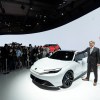
The Porsche Taycan Is the Least Efficient Electric Car
Electric cars are here, and their popularity among consumers is growing. What may have started with a Tesla initiative has now inspired an EV movement among many other manufacturers. Not to be outdone, Porsche introduced the Taycan Turbo last September. This car certainly caught everyone’s attention and offered a stunning design.
But, much to Porsche’s dismay, the efficiency ratings for this stealthy little performance beast are terrible. And, according to some, it’s the least efficient electric car on the market altogether. While Porsche is typically a dominant marque in terms of performance, luxury, and quality, we wanted to learn more about why they failed in the efficiency category.
Thankfully, Engineering Explained has the answers.
The EPA has spoken
As consumers continue to look for more sustainable lifestyle options, the automakers have started to take heed. But, as each new EV rolls off the line, the Environmental Protection Agency steps in to evaluate the efficiency of the new models. The agency rates the vehicle’s performance and efficiency, based on battery life, weight, and eco-footprint. The news isn’t promising for the Porsche Taycan Turbo, and the EPA has spoken. The Porsche Taycan is listed as one of the most inefficient electric cars being offered in the U.S.
How the numbers compare to the competition
The EPA data suggests the car’s 93.4-kWh battery only offers a range of approximately 201 miles. In comparison with the Tesla Model S Long Range, that is a weak range. Tesla’s more efficient design and drivetrain use a 100-kWh battery to boast a 373-mile range. The Taycan’s range is a gas-equivalent of 69 mpg. This may sound impressive at first, but it pales in comparison to the Audi E-Tron’s 74 mpg or Tesla’s Model S Long Range 111 mpg.
The Porsche Taycan is heavier than some trucks
Weight is a significant factor in the Taycan’s inefficiencies. Despite the smaller size of the battery, the Porsche is almost one thousand pounds heavier than other EVs in its class. It’s actually heavier than some small pickups. When the engineers sit down to the design table, their objective is to configure enough power, with a healthy mileage range.
Had Porsche opted to scale down on weighted materials, or upgraded its battery output, the Taycan Turbo might have improved its efficiency. A traditional gas tank provides energy than today’s batteries, thus compromising efficiency and making the overall weight of the vehicle a significant factor in terms of ratings.
Should Porsche be worried?
Porsche wasn’t happy about the EPA’s recent release of data and ranking. In response, Porsche contracted an independent testing agency on its own, in hopes of proving better numbers. The AMCI performed testing on the Taycan Turbo and determined a 275-mile range, a tad better than the EPA’s numbers.
Porsche’s numbers were better still during the Worldwide Harmonized Light Vehicle Testing Procedure. In those European testing efforts, the Taycan rated almost 280 miles. The California AirResource Board certified the EV’s real-world range in more of the 281.8 and 282.7-mile range, last year.
Porsche enthusiasts are fiercely loyal to their brand and may not be affected by the EPA’s latest rankings. Porsche buyers will continue to buy Porsches, and there is no question the Taycan is a beautiful sedan. Buyers may be more interested in the aggressive performance the Taycan offers, rather than battery-life mileage anyway.
For those consumers who do put stock in the efficiency ratings, the Porsche Taycan Turbo may get crossed off the consideration list. When it comes to finding an electric vehicle that can perform and go the distance, efficiently, there are other models that might be better suited. And, at $150,000 starting price, there are probably more affordable EV options, as well.


